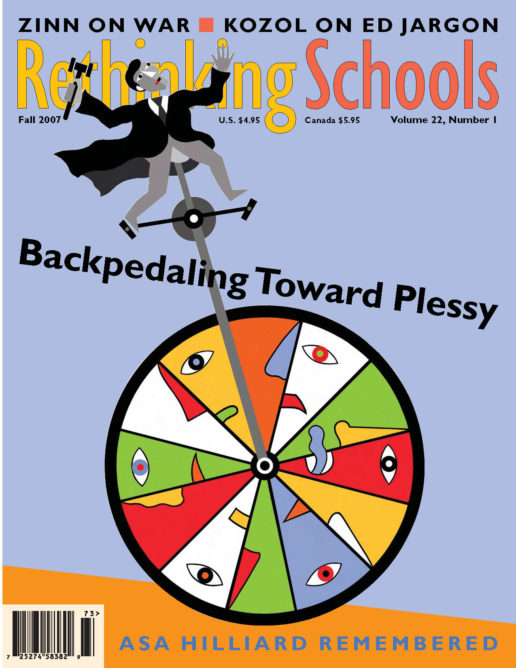The Passing of a Great Black Educator
Remembering Asa Hilliard
Asa Hilliard [1933~2007]
Rethinking Schools was saddened to learn of the death in August of Dr. Asa Hilliard who died in Egypt from complications from malaria. A valiant fighter for equal and quality education for African-American and all other children, he will be sorely missed.
– The editors
A prolific writer and speaker, Asa Hilliard was an outspoken advocate for equality and was identified with “Afro-centric” approaches to education. Born in Texas in 1933, and raised by his single mother in Denver after his parents divorced, Hilliard served in the Army, taught high school math and was a principal before being trained as an educational psychologist. Since 1980, Hilliard had been the Fuller E. Callaway Professor of Urban Education at Georgia State University and had previously been on the faculty of San Francisco State University.
Hilliard’s death made me reflect on the important role he had played in my own thinking about race and schooling, and what a large impact he had on many teachers and school districts throughout the country. The fact that Hilliard died in Egypt where he was leading an educational tour as he often did with college students, had a particular significance to me. I lived in Egypt for a year and a half as a teenager but it wasn’t until 20 years later, when I heard Hilliard speak to Milwaukee elementary teachers that I realized I had also lived as a teenager in Africa.
As with many Americans, I regarded Egypt and its ancient civilization as separate from the “dark continent.” Hilliard argued that not only were Egyptians more black African than European, but that many of the Greek and Roman philosophical, mathematical, and scientific achievements had African roots, much coming through Egypt. This was the essence of the collection of African-American Baseline Essays that Hilliard guided. While ideas and scholarship of some of the essays were hotly debated, Hilliard’s strong voice on these matters challenged many educators’ deep stereotypes about Africa and urged us to see the importance of race and racism in new ways.
Hilliard’s appearances in Milwaukee in the late 1980s inspired several district-wide teacher “curriculum councils” — back when the district valued teacher leadership. Hilliard’s work, including his simple yet powerful dictum that “curriculum is what is inside a teacher’s head,” guided the work of several teacher councils, especially the Multicultural Teacher Council, as we organized districtwide gatherings on multicultural, anti-racist education.
Hilliard advocated the elimination of standardized admissions tests as a key college admission criterion, saying they had “a disproportionate impact on those children who need school the most, the minority children.” He also spoke out more generally on standards and testing. In a 1997 Howard University speech, also reprinted in Rethinking Schools, he said, “To establish the standards of output without having standards of input is a travesty. To hold children responsible for outcomes without giving the same level of sophisticated attention to guaranteeing the standards of exposure is an abandonment of the responsibility of adults for the education and socialization of children.”
In the same speech he questioned the push for standards:
In some ways, I see the standards movement as Trivial Pursuit. We know it’s not a reform tool and yet we move ahead as if it’s a reform tool. I know why we ended up with national standards. After the Republicans gutted the social services budget, the politicians still wanted to look good to the people, so they could say they were making the best effort they could under the circumstances. In other words, they had to address the question, “What can I do with no money?” Basically, nothing but showboat.
Hilliard was known for straight talk, whether addressing educators or testifying as an expert witness in court cases on test validity and bias. In an essay in the forthcoming book Letters to the Next President (Teachers College Press, 2008) he couldn’t have been more blunt:
Turning urban teachers into robots executing scripted programs has not solved the schools’ problems. Disrespecting teachers and school leaders as professionals and giving more influence and control to leaders brought in from other noneducation professions and the monitors of scripted programs has not solved our problems. Worse, by reducing our urban teachers to “robots” and “zombies,” we take away one of their greatest teaching tools: the human bond they develop with their students.
That human bond Asa Hilliard writes about was evident in the passion with which he spoke about race, teaching, and the importance of expecting the most of our students and of ourselves. His exhortations for “excellence” weren’t based on arbitrary calls for higher test scores or demands that teachers do even more in impossible situations. Instead, they were rooted in a commitment to the struggle to overcome inequality in our schools and society. Dr. Hilliard insisted that teachers be treated as professionals and act as professionals as we seek to deepen our understanding of history and race, and our abilities to teach and reach all children.

